Introduction
A few days ago, a job post for a "Vibe Growth Marketing Manager" went viral on Linkedin. For some, the title was a bit confusing, but it was the skill requirements that really caught attention.
One line in particular stood out: "A builder who prototypes and ships faster than most teams can spec a brief." This wasn’t your typical marketing job description. Most marketing roles ask for strategy development and campaign execution, but this role is specifically for marketers who can build.
It’s a sign of how marketing is evolving. Marketers like Marin Perez took to LinkedIn and X and talked about how the title might sound unusual now. But in a few years, these kinds of job expectations will be the norm. As he rightly observed, every marketer will need to be fast, AI-fluent, and capable of automating much of their stacks and workflows.
AI is blurring the lines between creativity and engineering. The best marketers will be part builders, part creative strategists, and part AI technologists. Yet another user, Mike Futia, points out that Marketing is becoming more like engineering, while Marin Perez highlights how Marketing is changing.
In this blog, we’ll break down the current trends and explore whether AI will really take over marketing jobs and the broader marketing function. We'll look at the impact AI is having today, what the future might hold, and most importantly how marketers can adapt to the changing landscape.
Will AI Replace Marketing?
No, AI will not replace Marketing.
It's undeniable that marketing is undergoing a shift. But there’s also growing debate about whether marketing, as a whole, is on the verge of disappearing. The ongoing wave of layoffs, combined with reports like Goldman Sachs’ prediction of 300 million jobs being lost, has only intensified the conversation. Studies and news about job cuts, new roles requiring AI skills, and the demand for AI expertise have further fueled the fire.
While it might be premature to say AI will completely replace marketing jobs, the claim that AI will entirely take over the marketing function seems like an overblown and reactive response to disruption.
Current Impact of AI on Marketing
Recently, a marketer shared how they were warned that without upskilling in AI, they could lose their job. Another user mentioned how they no longer receive new gigs for proofreading and editing, a role once in high demand. Yet another marketer shared their experience of being let go as a website and social media manager, only to have their role replaced by AI tools that automated these tasks.
These aren’t isolated incidents. This is the reality for many marketers ever since AI disrupted the industry. So, what does this mean for the current expectations of marketers in an AI-driven world?
Let’s take a closer look at the trends, shifts, and emerging demands in the landscape today.
Evolving Expectations
A recent McKinsey Survey revealed that a majority of marketing teams are adopting generative AI capabilities like code, text, image, and audio generation, along with automated customer conversations. This shift is transforming marketing roles, as organizations increasingly seek marketers who can blend creativity with technology to deliver faster, more efficient results.
Marketers are now expected to become more agile, using AI to generate content, automate workflows, and create marketing materials at unprecedented speeds. HubSpot’s 2025 AI Trends for Marketers Report further highlights this change, revealing that 74% of marketing professionals are already leveraging AI in their roles, and 65% of marketing leaders plan to increase their investment in AI tools and automation throughout 2025.
As a result, traditional siloed roles in marketing are blurring, with one person now expected to manage creative direction, campaign execution, and data-driven decision-making, all while utilizing AI to enhance efficiency.
Efficiencies at Scale
Marketing has always been a demanding job, but with the rise of AI, the pressure is only increasing. The need for marketers to juggle multiple tasks, deliver results at lightning speed, and constantly adapt to new tools has intensified. The integration of AI has led to remarkable efficiencies at scale, particularly for larger organizations, which no longer need expansive marketing teams to execute their strategies.
According to a Hubspot’s Survey, 78% of marketers agree that AI significantly reduces time spent on tasks like data entry and scheduling. This allows them to focus on strategy and creativity, key areas that AI can’t replicate.
In content creation, 55% of marketers leverage AI for text-based content, while 38% use it for multimedia like images and videos. AI’s ability to handle repetitive tasks enables marketing teams to scale faster without increasing headcount.
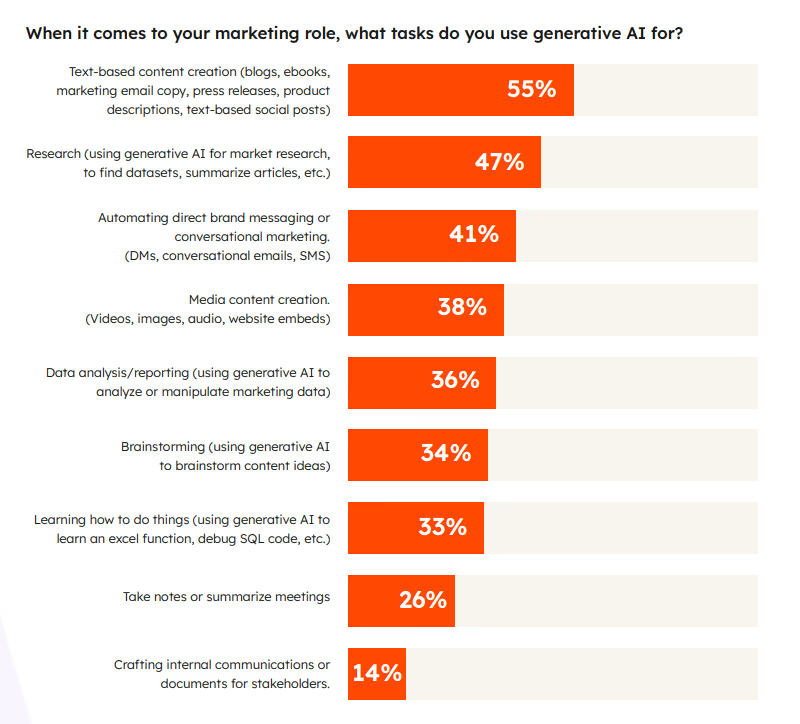
All of these efficiencies have a significant impact on how marketing teams are structured. Larger organizations are now operating with leaner teams because AI enables them to scale without needing to proportionally increase headcount. This shift is one of the reasons employers are emphasizing AI fluency as a mandatory skill for marketers.
As AI continues to evolve and transform marketing operations, job requirements in the industry will increasingly reflect the need for AI expertise. The demand for AI skills will only grow in the coming years, and marketers who fail to upskill risk being left behind in this fast-changing landscape.
The Shift Towards Speed & Automation
AI automation is enabling marketers to work faster and scale their efforts rapidly. More companies are experimenting with, and discovering, areas of their marketing workflows that can be automated, freeing up time for more strategic, high-level tasks. Marketers are actively sharing their AI-powered workflows with their communities, showcasing just how much automation can improve efficiency and creativity.
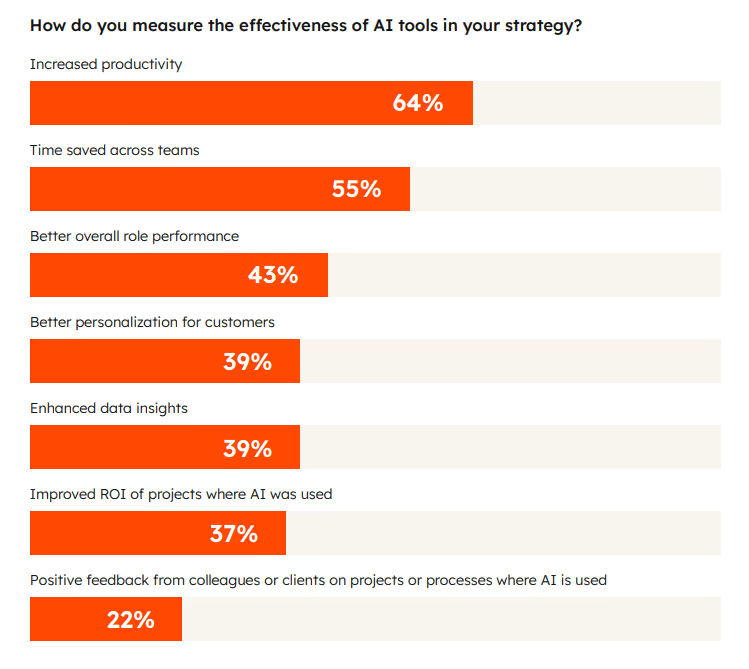
For example, Nate Herkelman, Co-founder & CGO of TrueHorizon AI, built an AI marketing agent using n8n that automates the entire content creation and posting process. His system can generate text, create and edit images, pull content from databases, and even post to LinkedIn without any manual intervention.
And it's not just about content creation. Sanjai Kumar M, a developer and fellow AI enthusiast, took it a step further by automating complex marketing workflows. He set up a system where user data is collected through Google Forms, processed in Google Sheets, and merged with AI-generated email content before sending personalized campaigns. This sophisticated use of AI allows for seamless, automated marketing campaigns that require minimal human oversight.
These examples show that AI automation is not limited to content creation and posting. Marketers are uncovering more advanced use cases like automating data collection, email personalization, and campaign management, tasks that once required significant manual effort.
As more organizations experiment with these workflows, they’re finding ways to speed up operations while maintaining quality, enabling teams to focus on strategy, creativity, and innovation.
Why AI Will Not Replace Marketing?
While it’s true that AI is transforming the industry at a rapid pace, it’s not set to eliminate marketing roles altogether. In fact, Sam Altman, CEO of Open AI, himself in a diplomatic stance, suggests that AI could replace 95% of creative marketing work, a claim that CMSwire has called ambitious. But, it's also important to note that this doesn’t mean the entire marketing function or jobs will disappear.
As we’ve seen in the trends and transformations mentioned above, companies are increasingly looking to automate repetitive tasks, and this often sparks concern about job displacement. But, as history has shown, when one job disappears, another is created.
During the industrial revolution, trains didn’t replace commuting altogether. They sped up travel. Similarly, computers didn’t eliminate accountants; they made their work more efficient, creating opportunities for higher-value roles.
While it's true that some jobs will be lost, more jobs will be created in the long run. For example, Forbes predicts that 170 million new jobs will emerge by 2030 due to AI-driven transformation. These new roles will be AI-centric, much like how computers reshaped industries in the 2000s.
Instead of eliminating marketing jobs, AI is providing an opportunity for marketers to upskill and move into higher-level, AI-augmented roles.
The knee-jerk reactions to job losses during disruptions have always been part of the narrative, but history has shown that innovation leads to new opportunities. Marketers will need to adapt, and those who embrace AI will find themselves in even more strategic, creative, and rewarding roles in the future.
Key Skills For Marketers in the Age of AI
The rise of AI has redefined the role of marketers. As technology continues to evolve, so do the skills required to stay ahead. To thrive in this AI-driven landscape, marketers must go beyond traditional expertise and embrace new technical skills.
Let’s dive into the key skills that are essential for marketers to succeed in the age of AI.
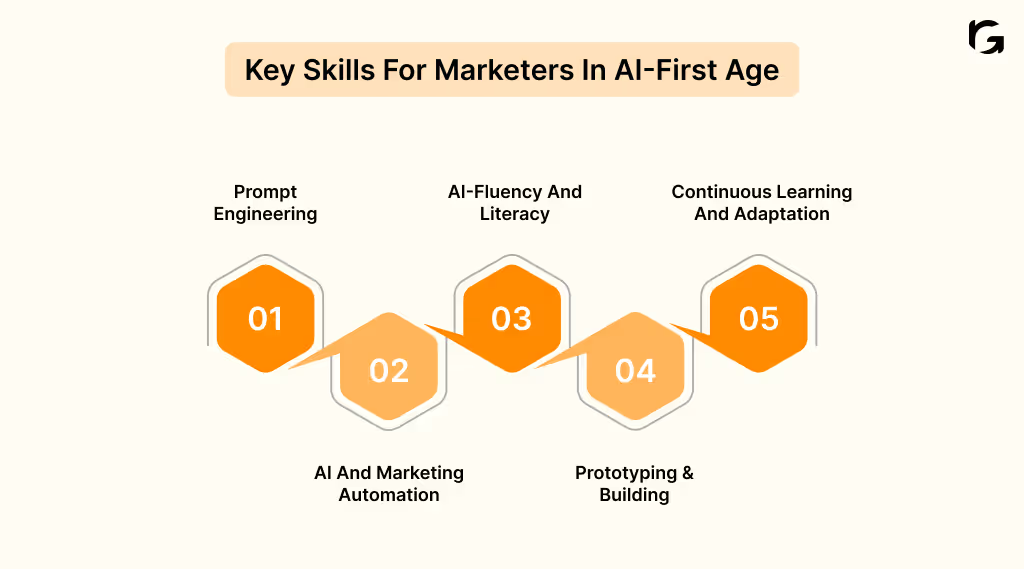
Prompt Engineering
Prompt engineering is the practice of crafting specific inputs or commands that guide AI tools like ChatGPT to generate the desired output, whether it’s text, images, or other forms of content.
AI tools can generate content quickly, but the output quality depends on how well the input is crafted. With effective prompt engineering, marketers can save time and increase the relevance and accuracy of the generated content, improving overall marketing efficiency.
At RevvGrowth, our content team develops customized prompts that are fine-tuned for SEO-driven blog projects. By tailoring prompts for different topics, keywords, and target audiences, our team ensures that AI generates content that aligns with both SEO objectives and the intended tone.
With a single, well-crafted prompt, our team produces high-ranking blogs for our website and clients, saving time and maintaining consistency across multiple projects.
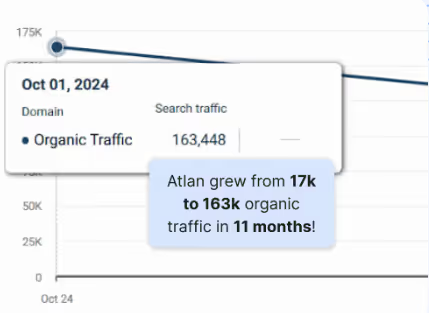
AI and Marketing Automation
AI and marketing automation involve using AI-powered tools to automate repetitive tasks such as lead nurturing, email campaigns, social media posting, and customer segmentation.
Marketing automation powered by AI helps marketers scale efforts, improve efficiency, and personalize customer experiences without increasing resource investment. It allows teams to focus on higher-value activities while automating routine work.
For example, Manish M, founder of GrowwStacks, created an AI-powered automation workflow in n8n that processes both voice and text commands through Telegram. This workflow automatically transcribes voice recordings into actionable tasks, uses AI to generate content for various platforms, and posts directly to LinkedIn, blogs, and more.
By automating the content creation and publishing process, Manish saves over 12 hours every week, allowing him to focus on strategy rather than manual content production.
At RevvGrowth, our growth team has developed similar AI-driven workflows. One such automation is the Ad Account Audit Assistant.
This tool connects directly to Google Ads accounts using the Google Ads API. It pulls campaign data such as click-through rates (CTR), cost per acquisition (CPA), and conversions.
Using GPT-4, it identifies underperforming campaigns, flagging issues like high spend with low return and generates actionable recommendations. These include suggestions like restructuring ad groups, adjusting keyword bids, or excluding ineffective audience segments.
This automation helps the team catch performance drops early and take corrective action without waiting for manual audits. It cuts down turnaround time for account optimization and reduces dependency on constant human monitoring.
AI-Fluency and Literacy
AI-fluency refers to the ability to understand and utilize AI tools effectively, while AI literacy means being able to grasp the fundamental concepts behind AI technology and its applications in marketing.
As AI continues to revolutionize the marketing landscape, the demand for AI-fluent professionals is rising rapidly. In fact, 71% of employers in 2024 prioritize AI skills over traditional experience when hiring, highlighting the shift towards AI-driven roles.
While this trend has been growing for over three years, many marketers and employees are still struggling to catch up. According to Forbes, a significant number of workers still require assistance to become AI-literate, signaling a gap in AI education and training within the industry.
This gap presents a challenge for marketers who want to remain competitive. The ability to use AI tools effectively is becoming a core competency, but without proper upskilling, many marketers risk being left behind.
AI literacy is no longer just a "nice-to-have.” It’s essential to survive in this AI age. Whether it’s understanding how AI can enhance data analysis, automate content creation, or optimize customer interactions, marketers need to continuously adapt to stay relevant in a rapidly changing market.
At RevvGrowth, we’ve addressed this challenge head-on. We are an AI-first company and team. For every task, project, or function, our first question is: Can we build this with AI?
From day one, we’ve treated AI not as a trend to catch up with, but as the default approach to getting things done. Whether it’s marketing, operations, sales, or support, we actively explore, build, and deploy AI-powered workflows across all functions. It’s part of our internal culture and one of our most important shared goals.
We experiment with them, learn their limitations, push their capabilities, and document everything we build. These learnings are shared across teams to ensure that AI adoption is not siloed but integrated company-wide. That’s how we’re closing the literacy gap, not just by teaching AI, but by building with it daily.
Prototyping & Building
Prototyping with AI involves using AI tools to quickly design and create digital assets such as websites, landing pages, and social media posts, often automating the design process.
Prototyping allows marketers to rapidly test and iterate on design ideas without needing advanced technical skills. AI tools can streamline the design process, enabling faster and more cost-effective content production.
Our team built a custom GPT that generates fully branded landing pages in under 30 minutes. All they have to do is fill out a short internal form with inputs like target audience, campaign goal, positioning, and reference content. These inputs are passed to a GPT-4 agent designed with structured prompts.
The output includes all major page elements: headline, subheadline, value propositions, call-to-actions, and section layouts. It renders a previewable HTML page using Tailwind-styled React templates deployed via Vercel.
This replaces the usual 3–4 day turnaround for landing page creation with a self-serve system that maintains brand consistency across campaigns without any design or dev bottlenecks involved.
Continuous Learning and Adaptation
Continuous learning in AI involves staying current with the latest AI trends, tools, and best practices to remain relevant in an evolving digital landscape.
AI is changing rapidly, and marketers who don’t keep up will fall behind. By continuously adapting and learning, marketers can stay ahead of technological shifts and use new tools to gain a competitive edge.
At RevvGrowth, we’re a team of AI enthusiasts who believe in building with it. Across marketing, content, design, sales, and operations, our teams are always asking: What can we automate, enhance, or rethink using AI?
We don’t wait for industry standards to tell us what to do. We actively experiment, test new workflows, push the boundaries of what’s possible with generative AI, and share our learnings across the organization.
Our AI tool stack reflects this diversity and depth of experimentation:
- ChatGPT (GPT-4): for content drafting, sales support, SEO workflows, and internal tools
- Claude: for longform synthesis, knowledge extraction, and better prompt reasoning
- Notion AI: for team documentation, meeting summaries, and knowledge base upkeep
- Vercel + GPT-4 APIs: to build custom internal tools like our Landing Page Generator
- Perplexity AI: for quick research and market synthesis
- ElevenLabs: for voiceovers and campaign personalization at scale
Whether it's building internal AI agents to handle briefs and ideation, or prototyping GPT-powered landing page builders and automation tools, we treat AI as infrastructure, not just an enhancement.
This culture of rapid experimentation has not only made us more agile but also unlocked new creative and operational possibilities across departments. Our teams share what they learn, document their AI workflows, and continuously level up because in a landscape this fast-moving, learning is not just ongoing, it’s mission-critical.
As AI becomes more integrated into marketing, the demand for marketers to be tech-savvy and adaptable has never been higher. The ability to leverage AI tools effectively can set you apart and future-proof your career in the ever-changing world of marketing.
Conclusion
The question isn’t “Will AI replace marketers?”
It’s “Are you becoming the kind of marketer AI can’t replace?”
AI won’t kill marketing. But it will kill outdated marketing roles. It will strip away the fluff, the inefficiency, the “just follow the brief” mindset. What it leaves behind is a leaner, faster, more technical version of marketing, where speed, adaptability, and creativity at the command line matter more than years of traditional experience.
Marketers who survive this shift won’t be the ones who resist it. They’ll be the ones building with it, automating workflows, shipping faster, and leveraging AI not as a shortcut, but as a multiplier.
This isn’t about saving your job. It’s about rewriting what the job even is.
The future of marketing won’t be built by marketers who do things the way they’ve always been done. It’ll be built by those who ask “What can I automate?” before they ask “What campaign should I run?”
At RevvGrowth, we help B2B brands evolve their marketing with AI.
Whether you’re rethinking your content engine, building AI-led campaigns, or redefining team workflows, we turn change into growth.
Book a strategy call and let’s explore how AI-powered marketing can drive your next phase of scale.

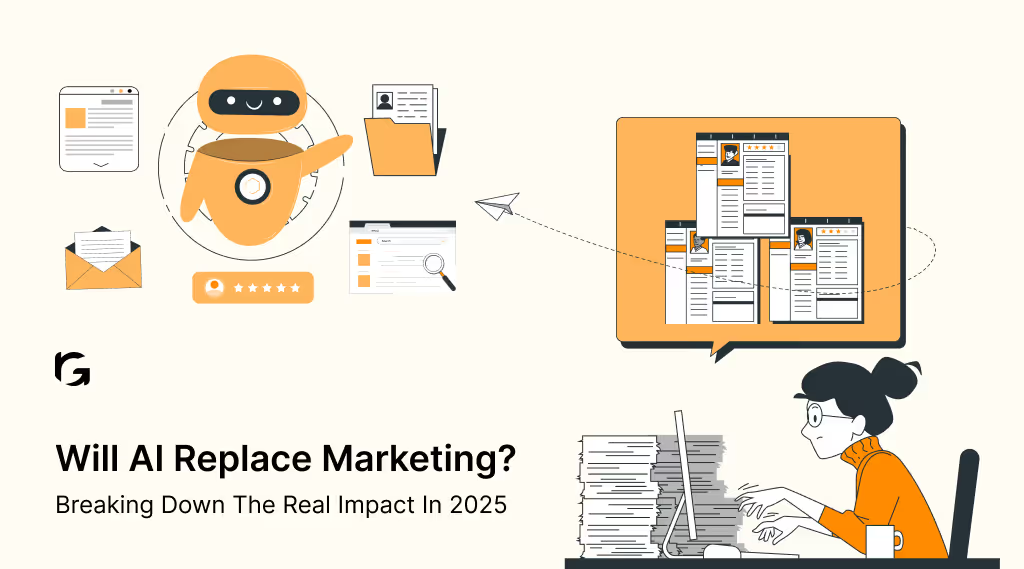

.svg)
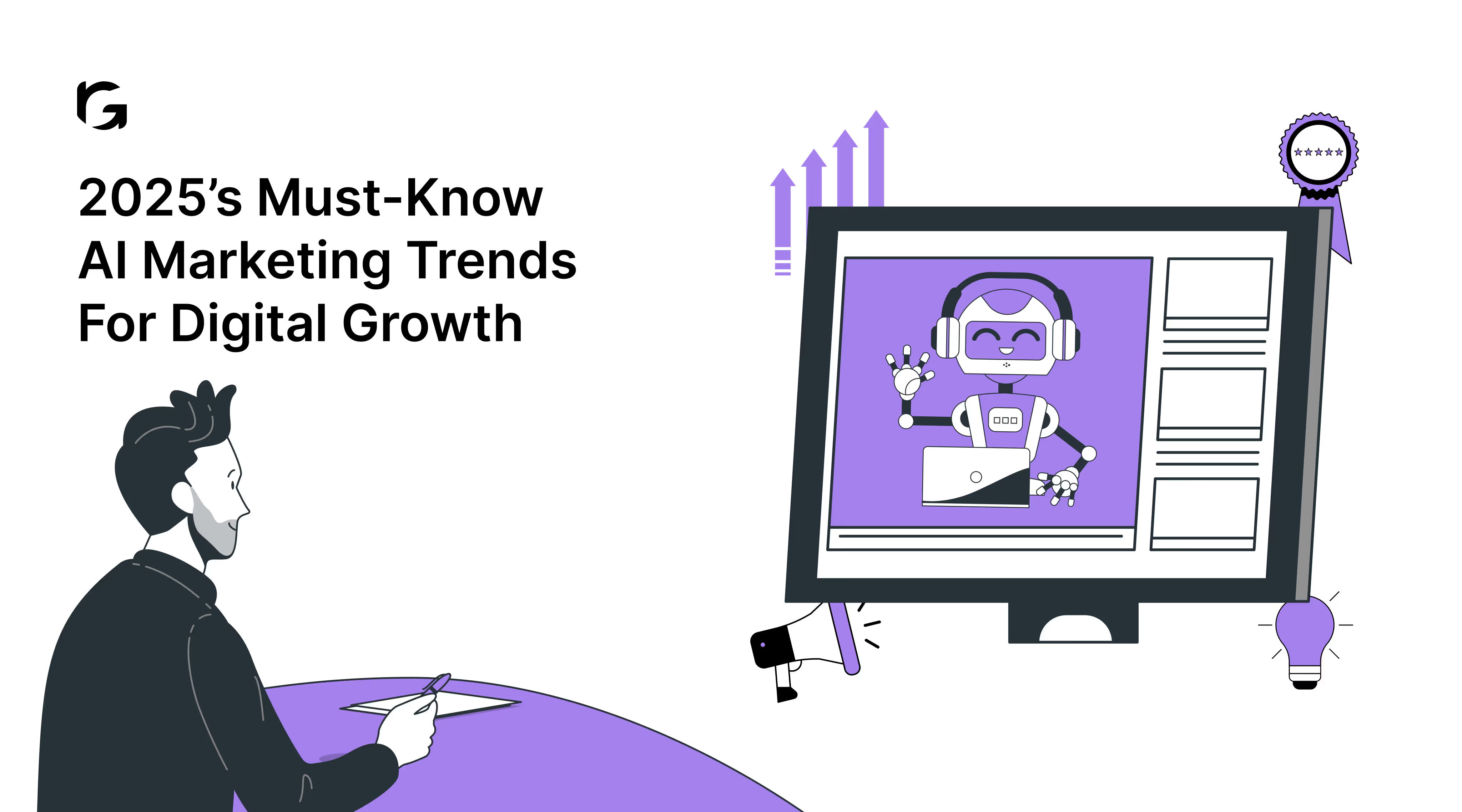
.avif)
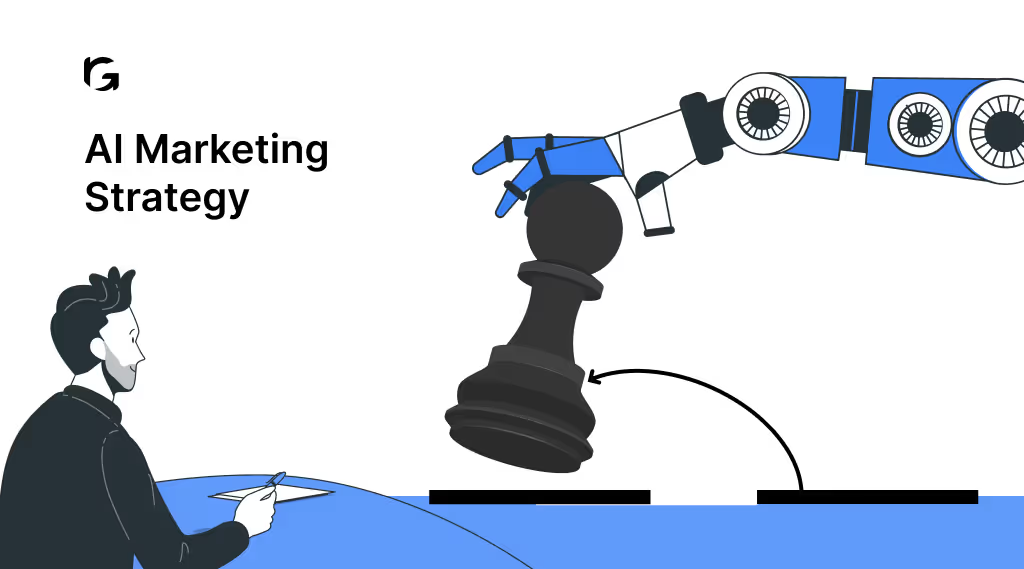
.webp)